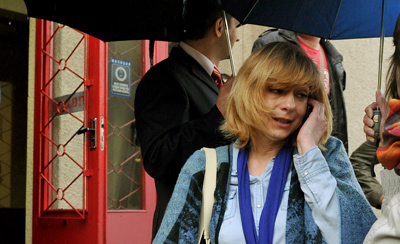Is Irina Khalip, the prominent Belarusian journalist, free to travel? President Aleksandr Lukashenko, whose government prosecuted her on bogus charges of creating mass disorder, says that she is. That Khalip has not, the president said, shows that she would prefer to be known as a “victim of the regime.” Of course, this all seems strange considering that Khalip’s sentence requires her to be home by 10 p.m. daily.
Speaking with journalists at a January 15 news conference, Lukashenko singled out Khalip in response to a question about political prisoners. According to the official transcript, Lukashenko said that Khalip has “refused to leave Belarus in spite of the provided opportunity.”
“She is not silly. She is a journalist,” he said. “She understands well that today she is ‘a victim of the regime’ and tomorrow they will forget about her. Perhaps that is why she stayed here.” A week later, Aleksei Stuk, deputy general prosecutor, told the Belarusian Association of Journalists that Khalip is not under any travel restrictions.
But Khalip’s sentence, handed down in May 2011, seems to have precise and strict requirements. For two years, she is required to be in her Minsk apartment each night from 10 p.m. to 6 a.m. On a weekly basis, she must check in with the district police. If she wants to travel at all, she must get permission from police; any trip outside Minsk must last less than 30 days. Violation of any of the requirements would land Khalip in jail, she told the Belarusian Association of Journalists.
As if to reinforce the restrictions, police showed up at Khalip’s door just one evening after Lukashenko made his comments to reporters.
If Khalip is depicting herself as a victim, then the KGB, police, and prosecutors have certainly done their best to help create that portrayal: In the last several years, they shut down her newspaper, raided her apartment, confiscated her reporting equipment, and fabricated criminal cases against her. They also imprisoned her husband and threatened to place the couple’s son in a foster home. Khalip was put under strict house arrest and sentenced. Last April, facing international protests, Lukashenko pardoned her husband, the opposition politician Andrei Sannikov, and allowed him to leave the country for the United Kingdom, where he was granted asylum.
For her part, Khalip has decided to take Lukashenko at his word. News reports say that she has sought permission from police to travel outside the country. Lukashenko should go even further now. In addition to granting her permission to leave, his government should vacate the fabricated criminal charges that made Khalip a victim in the first place.
